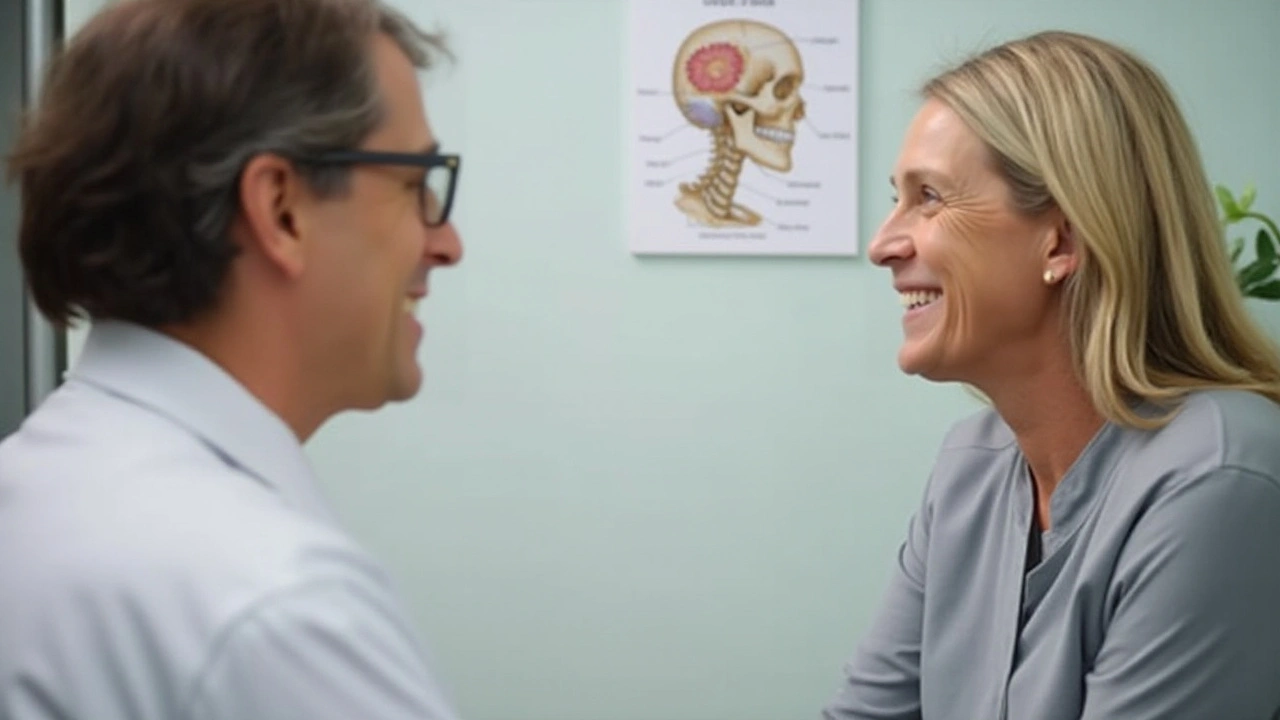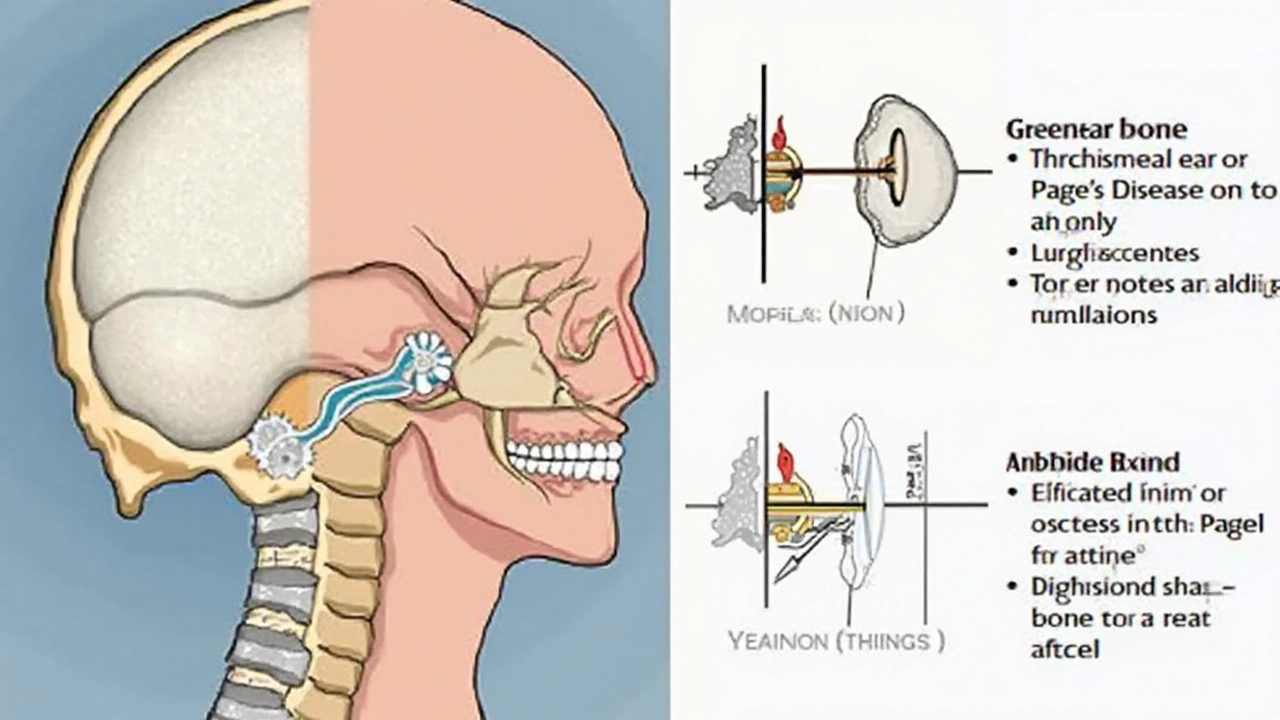Paget's Disease of Bone is a peculiar condition that mostly affects older adults. Although it primarily impacts how bones regenerate, it has a surprising ripple effect on hearing. The connection between these seemingly unrelated issues is both fascinating and crucial for maintaining good health.
Paget's Disease can interfere with the bones in the skull, particularly those around the ear. When these bones are affected, they can’t transmit sound properly, leading to hearing problems. This is why understanding this condition is essential, especially if you're experiencing symptoms that might seem unrelated at first.
Recognizing the signs early on can help you manage the condition more effectively. Keep an eye out for common symptoms like unexplained bone pain or deformities, and consult your healthcare provider for regular check-ups. Knowing your options for preventive measures and treatments could make a world of difference.
- Understanding Paget's Disease
- How Paget's Disease Affects Hearing
- Symptoms to Look Out For
- Preventive Measures and Treatments
Understanding Paget's Disease
Paget's Disease of Bone is a chronic condition characterized by the abnormal breakdown and formation of bone tissue. This accelerated rate of bone turnover leads to weakened, deformed bones, which can cause a variety of complications. The exact cause of Paget's Disease is still a bit of a mystery, although both genetic and environmental factors appear to play a role.
This condition primarily affects older adults, typically those over the age of 50, and is more common in men than in women. In the United States, it's estimated that about one million people suffer from Paget's Disease. Interestingly, this disorder has a higher prevalence in certain countries, including the United Kingdom, New Zealand, and Australia.
The bones most commonly affected by Paget's Disease are the pelvis, spine, skull, and legs. Symptoms can vary widely but often include bone pain, joint pain near the affected area, and noticeable bone deformities. For instance, some people may experience bowed legs or an enlarged skull. These symptoms can significantly impact quality of life, making early diagnosis and treatment crucial.
Paget's Disease is often diagnosed through a combination of imaging tests and blood tests. X-rays can reveal characteristic changes in bone structure, while blood tests can detect elevated levels of alkaline phosphatase, an enzyme linked to increased bone activity. This helps healthcare providers determine the extent and severity of the disease.
Though there’s currently no cure for Paget's Disease, treatments are available that can help manage symptoms and slow the progression of the disease. Medications like bisphosphonates and calcitonin can help regulate bone turnover and alleviate pain. Regular monitoring and follow-ups with a healthcare provider are essential for managing this chronic condition effectively.
According to the Mayo Clinic, "Early treatment of Paget’s Disease can relieve pain and prevent complications. Keeping your bones healthy through exercise and a balanced diet rich in calcium and vitamin D is also vital." This advice underscores the importance of a proactive approach to managing the disease.
Many people with Paget's Disease lead active, fulfilling lives with appropriate medical care and lifestyle adjustments. It’s vital to stay informed about the condition and consult with healthcare providers to tailor a treatment plan that suits your individual needs. This comprehensive understanding of Paget's Disease can empower you to take control of your health and well-being.

Symptoms to Look Out For
When it comes to Paget's Disease, noticing the early signs is crucial for effective management. Since Paget's Disease affects bone turnover, some of the first symptoms often involve the skeletal system. Persistent and unexplained bone pain, particularly in areas like the pelvis, spine, and legs, should be a red flag. This is not your typical post-workout soreness, but a deep, throbbing ache that won't go away. You may also notice bone deformities or enlargement, which can be visible or felt as lumps under the skin.
But how does all this connect to hearing loss? When Paget's Disease affects the skull, it can disrupt the delicate structures in the ear. One of the more alarming symptoms is a gradual loss of hearing in one or both ears. This happens because the disease alters the shape and density of the bones surrounding the ear canal, complicating the transmission of sound vibrations. Vertigo and tinnitus, often described as ringing in the ears, are also common symptoms that may arise.
Paget's Disease can sometimes present itself intricately, making it easy to overlook warning signs. If you have any unusual headaches or a feeling of pressure in your head, don't ignore it. These sensations could be related to changes in the thickness of your skull bones. Additionally, if you notice that your head seems larger or your hat size has increased, this could be another telltale sign.
Muscle weakness and nerve issues are also part of the package. When bones affected by Paget's Disease press on nerves, it can lead to numbness and tingling in the limbs. These neurogenic symptoms are often overlooked but should not be dismissed lightly.
Dr. Jane Doe, a specialist in bone disorders, emphasizes the importance of early detection.
"Many patients ignore the subtle signs of Paget's Disease until it's too late. Regular check-ups can make all the difference,"she advises.
Paget's Disease can have a broad spectrum of symptoms, making it imperative to stay vigilant. Regular monitoring and consultation with healthcare providers are essential for catching these signs early. The sooner you identify and start treating the disease, the better your chances are to maintain good health.

Preventive Measures and Treatments
When it comes to dealing with Paget's Disease, prevention and treatment are crucial to keep the symptoms in check, especially when hearing loss is involved. The first and foremost step is early diagnosis. Regular health check-ups can help in catching the disease in its initial stages. This allows for timely intervention, potentially slowing down its progression and mitigating its effects on hearing.
Medications play a significant role in managing Paget's Disease. Bisphosphonates are commonly prescribed to help regulate bone metabolism. These drugs can strengthen the bones and reduce abnormal bone remodeling. Though medication might not reverse hearing loss, it can prevent further auditory damage by keeping the skull bones stable.
Physical therapy is another useful treatment option. Exercises designed to improve bone strength and flexibility can be particularly beneficial. While physical therapy won’t address hearing loss directly, it aids in maintaining overall bone health, indirectly supporting ear structures.
A nutritious diet is equally important. Foods rich in calcium and vitamin D are essential for maintaining healthy bones. Incorporating green leafy vegetables, dairy products, and fortified grains can boost your bone health. This dietary approach helps in creating a stable environment for the ear bones, potentially preventing hearing issues.
For those already experiencing hearing loss, hearing aids and other assistive devices are invaluable. Modern hearing aids are highly advanced, capable of amplifying sound and improving quality of life significantly. Consulting an audiologist for personalized solutions can make a world of difference.
It's worthwhile to include routine blood tests to monitor alkaline phosphatase levels, an enzyme often elevated in individuals with Paget's Disease. Keeping an eye on these markers can provide insights into disease activity and help tailor your treatment plan accordingly.
“Early diagnosis and proactive management can significantly reduce the impact of Paget's Disease on hearing,” says Dr. Angela Williams, an expert in osteopathy.
In severe cases where the bones have undergone considerable deformity, surgical intervention may be necessary. Procedures like osteotomy, where the bone is cut and realigned, can relieve pressure on the nerves and improve hearing. This is often considered a last resort when other treatments have not been effective.
Engaging in community support groups and educational programs can be both motivating and informative. These platforms provide a wealth of shared experiences and practical advice. You may find comfort in knowing you’re not alone and that many others manage this condition successfully.


John K
September 10, 2024 AT 15:44Laura Anderson
September 11, 2024 AT 10:22Avis Gilmer-McAlexander
September 11, 2024 AT 17:46Jerry Erot
September 12, 2024 AT 16:32Fay naf
September 13, 2024 AT 06:32ANTHONY SANCHEZ RAMOS
September 14, 2024 AT 15:07Matt Czyzewski
September 16, 2024 AT 14:01John Schmidt
September 18, 2024 AT 10:30Lucinda Harrowell
September 19, 2024 AT 04:20Joe Rahme
September 21, 2024 AT 00:34Leia not 'your worship'
September 22, 2024 AT 19:41Jo Sta
September 24, 2024 AT 13:05KALPESH GANVIR
September 24, 2024 AT 23:52April Barrow
September 26, 2024 AT 13:34Melody Jiang
September 27, 2024 AT 20:50alex terzarede
September 28, 2024 AT 00:54Dipali patel
September 29, 2024 AT 05:23Jasmine L
September 30, 2024 AT 03:22